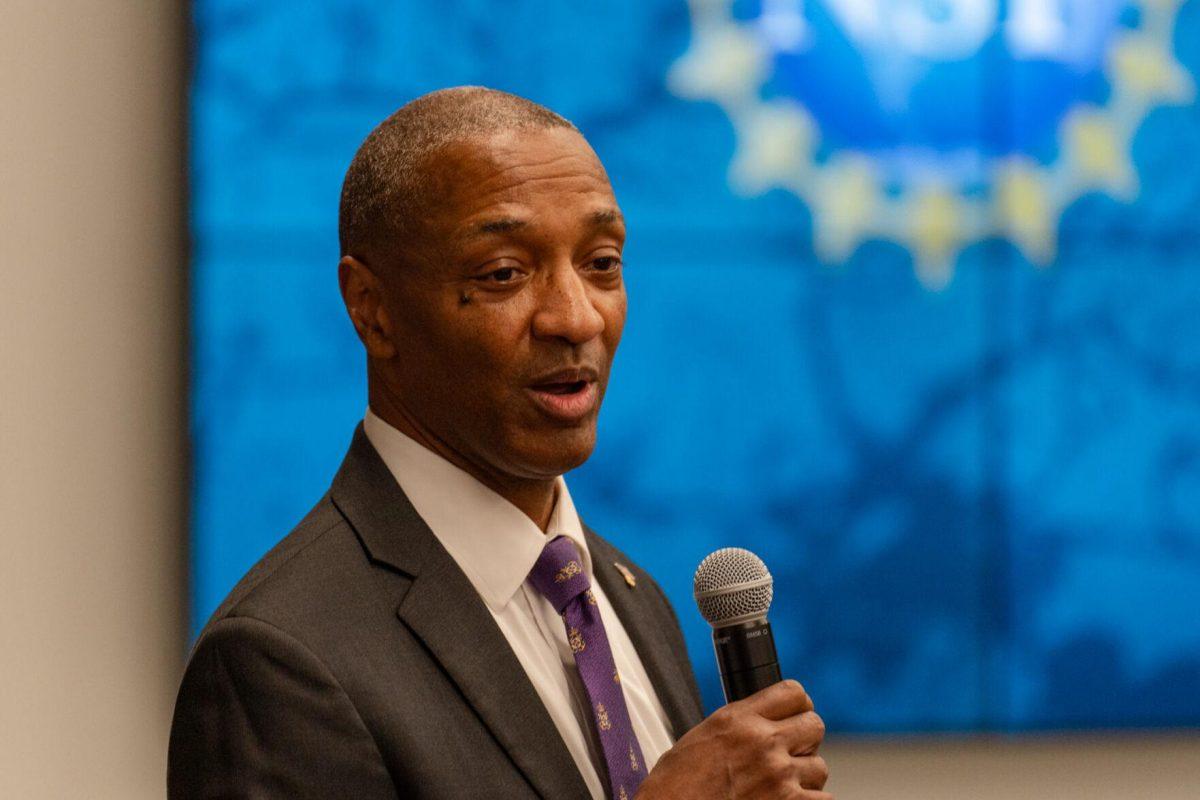The AgCenter has lost 330 faculty members since 2008, partly because of stagnant faculty salaries, a condition AgCenter Chancellor William “Bill” Richardson said he plans to remedy by eliminating administrative positions that will free up funds to potentially provide salary increases.
Richardson said the “very unusual” loss is a 29 percent reduction in full-time faculty and can be blamed on the trend of decreasing state appropriations that has left the AgCenter budget more than $23 million short of where it was just five years ago.
Executive Vice Chancellor and Provost Stuart Bell said Richardson’s predicament is not unknown to other university campuses.
“We’re using every opportunity to see if there’s a better way to meet the needs of the campus in terms of service and money,” Bell said. “But eventually you just can’t provide services.”
Some campuses can raise tuition to offset budget woes, but the AgCenter — which has no students — does not have that option.
While AgCenter faculty aren’t receiving pay raises, similar positions in neighboring states and in private industries have more to offer, and talented faculty are flocking to those jobs, Richardson said.
“It’s logical to me to think that people will want to leave,” Richardson said. “Salary increases are really wearing on people. I hear about that more than any other issue we’re dealing with.”
Of the 330 people the AgCenter has lost since 2008, 190 held academic positions, 125 were civil service employees with hourly pay and 15 held salaried but non-academic jobs.
Richardson said instead of ousting sitting administrators, he plans to simply not fill positions as they become vacant – starting with a vice chancellor position that was held by Paul Coreil, who retired earlier this semester to serve as LSU Alexandria’s interim chancellor.
AgCenter Associate Vice Chancellor Dwight Landreneau’s position will also be left vacant when he retires June 1, Richardson said.
The duties for these positions will be divided among five or six other AgCenter faculty members, including Richardson himself, he said.
Together, the salaries for these positions totaled about $365,000 plus benefits. However, Richardson said it would take about $500,000 to provide just a 1 percent salary increase for all AgCenter faculty.
Richardson said while he plans to “let the dust settle” on the budget decided by state legislators before determining what other administrative changes need to be made, he isn’t afraid to cut more positions if necessary.
“We’re trying to make our administrative structure as lean as possible,” Richardson said.
However, Richardson said he only plans to eliminate vacant positions rather than “those with bodies in them” and will examine what roles can be consolidated as positions open up.
Most students haven’t felt “the hard budget challenges we often talk about” because administrators and faculty have fought to preserve the core mission of academics and student experience, Bell said.
“We have a 23:1 student-faculty ratio now, but it used to be 18:1. We’re at that point where there’s not a lot left we can do. With every position we say, ‘Can we do something here?’” Bell said.
Reducing administrative positions is not the only measure Richardson is taking to combat dwindling state appropriations.
The AgCenter has closed three research stations around the state, asking already-stretched-thin employees to take on more responsibilities while cutting entire programs.
“In some cases we have things that just aren’t getting done,” Richardson said.
Looking at ways to streamline procedures is another goal of Richardson’s.
Richardson said he plans to hire Gina Eubanks, Southern University Agricultural Research and Extension Center vice chancellor for extension, who will fill a new position as the program leader for consumer and family sciences. Eubanks will take on the new role while continuing to fill her Southern position.
Working with Southern is something the AgCenter already does, and Eubanks will have a knowledge of both campuses, which will make business run even more smoothly, Richardson said.
“It’s logical to me to think that people will want to leave. Salary increases are really wearing on people. I hear about that more than any other issue we’re dealing with.”




